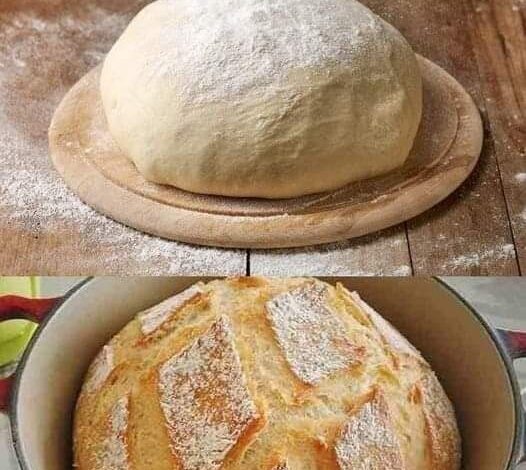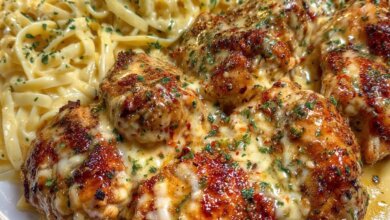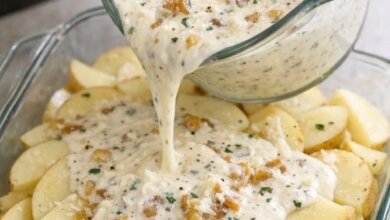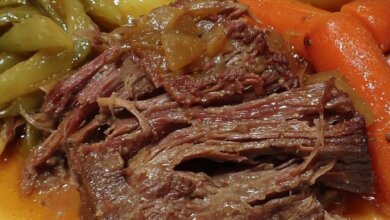No-Knead Bread Recipe

Introduction
Bread has been a staple in households for centuries, symbolizing warmth, hospitality, and nourishment. For those new to baking or seasoned bakers seeking simplicity, this no-knead bread recipe is a true revelation. Requiring minimal ingredients and effort, it’s ideal for anyone who loves the aroma of freshly baked bread without spending hours in the kitchen. The no-knead method is simple yet yields a crusty, flavorful loaf that can easily become the highlight of any meal.
History of No-Knead Bread
The concept of no-knead bread dates back centuries, with origins in ancient bread-making techniques used by various cultures. Traditional bread recipes often required kneading to develop gluten, which contributes to the bread’s structure and texture. However, the no-knead approach, popularized in recent decades, leverages long fermentation to achieve similar results. This allows home bakers to produce artisan-quality bread without the physical effort of kneading.
Benefits of No-Knead Bread
- Ease and Accessibility: This method is beginner-friendly, allowing anyone to bake quality bread without specialized skills.
- Improved Flavor: The extended fermentation period enhances the bread’s flavor, yielding a tangy, slightly nutty taste.
- Healthier Option: Homemade bread avoids the preservatives and additives often found in store-bought versions, offering a more natural choice.
Ingredients
- 3 cups all-purpose flour
- 1/2 teaspoon dry yeast
- 1 1/2 teaspoons salt
- 1 1/2 cups lukewarm water (around 110°F / 43°C)
Preparation and Method
- Mix Ingredients: In a large mixing bowl, whisk together the flour, yeast, and salt to ensure even distribution.
- Add Water and Form Dough: Gradually pour in the lukewarm water while stirring with a wooden spoon or spatula until a rough dough forms. Avoid overmixing to keep the texture light and airy.
- Fermentation: Cover the bowl with plastic wrap or a clean kitchen towel and let the dough rest at room temperature for 12-18 hours. The dough will rise and become bubbly, developing flavor through slow fermentation.
- Preheat the Oven: Preheat your oven to 450°F (230°C). Place a Dutch oven or a heavy pot with a lid in the oven to heat for 30 minutes.
- Shape the Dough: Once the pot is hot, dust a surface with flour and gently shape the dough into a round loaf using lightly floured hands. Avoid deflating the dough too much.
- Bake the Bread: Carefully transfer the dough to the hot pot, cover with the lid, and bake for 30 minutes. Then, remove the lid and bake for an additional 10-15 minutes, until the crust turns golden brown and crispy.
- Cool and Serve: Carefully remove the bread from the Dutch oven and let it cool on a wire rack before slicing. This step ensures a perfect crumb structure.
Nutritional Information (Per Slice)
- Calories: 150
- Protein: 4g
- Carbohydrates: 30g
- Fiber: 1g
- Fat: 0.5g
Who Will Love This Recipe?
- Beginner Bakers: The simplicity and no-knead aspect make it perfect for those new to bread making.
- Health Enthusiasts: With minimal, natural ingredients, it’s a healthier choice compared to many processed breads.
- Busy Home Cooks: The hands-off approach allows you to set it and forget it, perfect for those with tight schedules.
Formation
The no-knead process relies on long fermentation, which naturally develops gluten over time, creating a structure similar to kneaded bread. This results in a chewy texture and open crumb structure, with large, air-filled pockets typical of artisan-style bread.
Conclusion
This no-knead bread recipe is a perfect blend of simplicity and taste, requiring only a few basic ingredients and no advanced techniques. The result is a crusty, golden loaf that will impress your family and guests. Baking bread at home can be immensely rewarding, and this recipe proves that anyone can master it with ease. Enjoy a slice with your favorite spread or dip it into a warm soup; however, you choose to serve it, the experience of fresh, homemade bread is unmatched.



